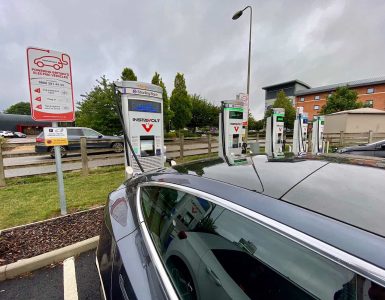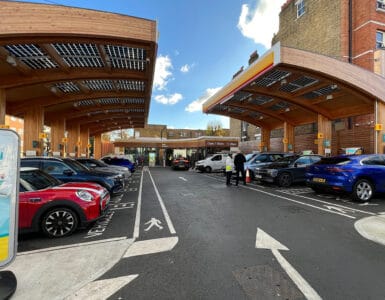24th February 2024 Charging Map

- The new charging map on the left side shows the UK’s most expensive and luxurious electricity operators the the top in red. all the way down to the Tesla supercharger prices for Tesla owners in blue providing electricity at faster, more reliable and easier to use chargers for less than half the cost of the red zone.
- The right hand side, with matching colours, shows the cost in pence per mile for more efficient EV’s that can travel 4 miles for every kWh of electricity, or the higher cost for EV’s that only travel 3.3 miles per kWh. The pence per mile number is the same as pounds per 100 miles.
- In orange we have included a snap shot of petrol cost per mile based on the RAC petrol price on the date of our survey, for a fairly typical 35mpg and 45mpg.
- Click on the image to expand it.
Commentary 27th February 2024
The elevated wholesale electricity price continues to wreak havoc with the cost of running cleantech in the UK even as enter 2024. From heat pumps running on electricity that is priced at more than 4x the cost of gas per kWh to EV charging at more than the price of petrol (and around 8x more than the cost of renewable electricity) the incentives are askew.
Our latest review of public charging network prices (click on image above to enlarge) again shows most major charging networks cost a lot more than petrol. While petrol and diesel pump prices have reduced again since our last update, the cost of EV charging remains at its peak with some operators charging even more than they did in January 2023. To see how much EV charging network prices have gone up since 2021 look at the table below.
We believe for an EV delivering 3.3 miles per kWh, parity with 144p per litre in an equivalent 40mpg petrol or diesel car would at the moment be 56p per kWh. By comparison 85p per kWh on the same numbers would come in about the same cost as paying £2.25 a litre.
One piece of good news is that while list prices of new electric cars remain very expensive after being pushed up during the chip shortage last year, many electric cars have huge discounts from dealers and stock for immediate delivery. About 35% is possible on some models.. equivalent to £13k off a £33k list price. For details check out our map of deals and how to find your own.
Charging price increase (decrease) table
| Network Price % increase | 2024 Price | 2023 Price | 2021 Price |
|---|---|---|---|
| Shell* +107% | 85p | 85p | 41p |
| BP Pulse* +102% | 85p | 85p | 42p** |
| Instavolt 150% | 85p | 75p | 30p |
| Be.EV | 82p | – | – |
| Osprey +119% | 79p | 79p | 36p |
| MFG +126% | 79p | 79p | 35p** |
| Geniepoint +102% | 79p | 79p | 39p** |
| Applegreen electric | 79p | ||
| Gridserve* +130% | 79p | 69p | 30p |
| MER | 78p | – | – |
| ESB 108% | 77p | 73p | 35p** |
| SmartChargeSainsbury | 75p | – | – |
| Evyve | 75p | – | – |
| Wenea | 75p | – | – |
| Ionity +7% | 74p | 74p | 69p |
| Chargeplace Scotland +16% | 70p | 35p+ | 30p |
| Swarco +139% | 69p-85p | 79p | 33p** |
| FastNed +87% | 69p | 69p | 39p |
| Forev | 65p | – | – |
| Dragon charging | 65p | – | – |
| Zest | 65p | ||
| evpoint | 65p | – | – |
| Source London PAYG -6% | 65p | 65p | 69p |
| Podpoint Lidl +182% | 65p | 65p | 23p** |
| Ubitricity/Shell lamp posts +66% | 44p | 40p | 24p |
| Tesla peak +80% | 43p | 54p | 30p |
| Tesla off peak +46% | 39p | 44p | 30p |
1 What’s happened to fuel v charging cost since 2021?
Petrol and diesel fuel prices in the fluctuate. During the pandemic they fell to around 117p per litre but assuming more normal prices they went from
- From 127p to 144p – 13.3% rise for petrol
- From 130p to 152.57p – 17.4% rise for Diesel
- The prices increases for most of the leading UK EV charging networks by comparison is over 100% since 2021 while one major network increase it’s prices by 150%
For historical charging cost numbers look at an Autocar review of various charging companies in their article 20th January 2021
As you can see it’s not petrol and diesel drivers that should be clamouring for relief from soaring prices, in fact charging costs are rising much faster than fuel. The Chancellor in his March 2024 ignored these issues again and further tipped the scales towards fossil fuels by freezing fuel duty again.
1 How we compare the costs – Petrol v Diesel v Electric
It’s quite hard to compare the cost of a liquid fuel burnt inside a piston engine with electricity running electric motors so we’ve made it super easy. We’ve taken RAC fuel price data on the date shown and done the maths. You just compare the cost in pounds to drive 100 miles.
If you don’t like comparing cost per thousand miles just move one decimal point to the left to get the price per 100 miles or pence per mile. e.g.
- £157 per 1,000 miles is the same as £15.70 per 100 miles
- The same number is also the cost in pence per mile ie 15.70p so it’s easy to compare our numbers with all 3 metrics
- If you want to try your own mpg or different prices per litre, there is a handy calculator at Fuel Economy UK
2 Cost comparison results – what do they tell us?
- Firstly, whatever car you drive it’s how efficient it is that makes a big difference to what you pay. If you drive a petrol or diesel that is averaging 45mpg or more then congratulations, you’ll save money compared to a vehicle delivering 35mpg or less.
- By comparison the savings you get switching to an electric car right now aren’t great when public charging but
- Electric car owners will sometimes pay more than petrol or diesel drivers, but many also have the chance to charge at 10x less. Slow AC and even some local DC chargers can be much less than the major networks. Off peak home tariffs can be as low as 7.5p per kWh. If they have their own solar panels charging might even be free. So while petrol and diesel prices pay much more similar prices everywhere, the average price electric car drivers pay from different sources should usually still be lower over a year even now.
- Want to save fuel cost without changing cars?
Well all cars are least efficient on short urban journeys when walking, cycling or public transport might be easier.
Not running your engine when parked up would also cut your fuel bills easily and cut pollution too
Driving at 50-60mph will save you money compared with driving at 70mph or more
Finally driving more efficiently, accelerating less hard and coming off the accelerator early when you are heading to a stationary queue or red traffic light will mean you get much further with each litre or kWh you purchase. It will also save money on brake pads. - Tesla– As a reference point the very efficient Tesla Model 3 and Y electric cars will probably deliver an average of 3.5 to 4.5 miles per kW/h over the whole year. Tesla Supercharger prices are around half the price of the major public networks.. so Tesla owners save with efficiency and electricity costs.
- Charging network prices should fall during the lifetime of your electric car and some manufacturers have discounted deals that could make your charging much cheaper. At the moment pressure on prices is still upward. Some networks may offer off peak discounted rates overnight.






